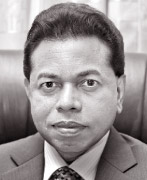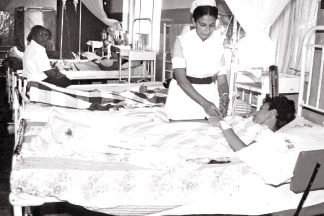|
Health Watch
IT’S YOUR HEALTH, We help!
Nadira Gunatilleke
The Sri Lankan health service has already been recognized by the WHO,
other International organizations and foreign countries as one of the
best in the world. We have the best health indicators in the SAARC and
Asian regions. Our maternal and infant mortality rates are very low.
|

Dr. Palitha Mahipala |
Our immunization coverage is very big and we have one of the finest
immunization programmes in the world. In general the Sri Lankan health
service has achieved very commendable results. Successive Governments
had allocated adequate funds to achieve this status. The Sri Lankan
Government considers monetary allocations on health as an investment and
not as an expenditure or welfare, Director General, Health Services, Dr.
Palitha Mahipala told Daily News Healthwatch during a recent interview.

Dr. Mahipala said that the Sri Lankan Government has increased the
health budget in recent times. In 2005 the Sri Lankan health budget was
Rs. 35 billion and in 2013 it is Rs. 125 billion. The present UPFA
Government led by President Mahinda Rajapaksa is very concerned about
the free health service. Our health care system is entirely free, from
immunization to bypass surgery. Even serious and expensive surgeries
such as brain surgeries are free. Any patient from anywhere in the
country can just walk in to any state hospital of his/her choice and
obtain treatment for any type of illness. There are no restrictions
whatsoever.
A patient from Jaffna can visit the Colombo National Hospital or any
other hospital and obtain treatment. There are a total of 1057 state
health institutions in the country and for each kilometer, there is one
such institution. So our coverage is so high. Ours is a unique health
care system. We have come a long way and today we are in a good
position.
Success story
According to Dr. Mahipala, Sri Lanka has already eliminated many
diseases. We eliminated Neonatal tetanus and there were no Polio cases
since 1993. Measles, Filaria etc have been eliminated. “We will
eliminate Malaria by 2014. We have a plan to face any epidemic such as
AH1N1.”

“We have a joint committee appointed by the Health Ministry together
with Director General, Health Services and Director General, Animal
Productions and Health. Every month we do reviews and take specimens
from patients. We have developed the diagnostic facilities at the
Medical Research Institute (MRI). Therefore we have a very good plan to
overcome any type of infectious disease. All the necessary resources are
with us. We are working to a plan.
Private health services
Dr. Mahipala pointed out that our private sector health service is
also catering to a large number of patients who can afford to pay for
their medical needs. The government is very concerned about regulating
the private sector health services. Private Sector Health Regulatory
Council was established. A bill was passed. The Health Ministry is
monitoring the private sector health service in order to ensure that the
patients get a quality service at a reasonable price.
We have developed state hospitals and other state medical
institutions during the last few years. A lot of new building complexes
with all modern facilities have been given to them along with advanced
high tech new medical equipment etc. we are in par with the developed
countries. We have good human resources. All medical/health staffs are
well trained, talented and dedicated. They treat patients well. But
there may be isolated incidents where patients are being mistreated.

Such incidents are always highlighted by media. Annually we treat 55
million patients and out of this number 99.99 per cent get cured and go
homes without any problem. They are satisfied and happy.
There are may be one or two health staffers who are not that
compassionate, kind and dedicated. We have now commenced a special
training for our health staff to overcome this weakness. They will be
given training on public relations, communication etc. Attention has
been paid to this area now, Dr. Mahipala said.
The act on the private health sector is to be amended soon in order
to strengthen the private sector health services. Private sector is
rendering a good service. We want to develop this sector further. At the
moment there are good private sector health institutions that offer a
good service with the assistance of our doctors. The doctors who work in
state hospitals also serve in private sector, he said.
Senaka Bibile Drug Policy
“The Senaka Bibile Drug Policy is one of the important policies to be
introduced soon. Around 20 to 25 percent of the entire health budget was
allocated to buy pharmaceuticals. The availability of drugs is very
important and we import about 1900 varieties of drugs. Most of the time
all drugs are available everywhere but media highlights only when a drug
or two is not available at one or two state hospitals.
President Mahinda Rajapaksa has mentioned about this in “Mahinda
Chinthana” -Vision for the future. The policy is now with the Legal
draftsman and it will be presented in the Parliament soon once the
procedures are over”, he added.
Dr. Mahipala said that the Government has made arrangements to
manufacture drugs locally. There is a JICA project where we are going to
spend over Rs. One Billion to improve the capacity of the SPMC. Some
other ventures are also going on in connection with producing IV drugs
etc. Two zones have already been identified in Kurunegala and Horana to
establish Pharmaceuticals Manufacturing Zones. Sri Lanka will produce
more and more drugs in future. Health Minister Maithripala Sirisena
visited Bangladesh recently and signed agreements between the Sri Lankan
Government and the Bangladesh Government to import drugs. Drugs are to
be important directly through foreign governments and not through
foreign companies.
“Once the ongoing court case is sorted out we will implement the
Tobacco and Alcohol Control Act strictly. Amending acts and bringing in
new bills are aimed at ensuring the quality of the health care service.
The leadership of the hospital is very important when it comes to
offering a good service and keeping the place clean and well organized.
The manager is the leader. But now almost all state hospitals are in a
better shape. They do not smell like old days and infrastructure is
being developed and many of them look like hotels.”
Appointment system
There is an awarding system to encourage them to be in a better
shape. We have introduced the appointment system to some state
hospitals. Now patients do not need to wait in long lines to obtain a
number for a clinic. Colombo National Hospital, Ampara, and Kalutara
hospitals now give appointments. We have taken steps to cut down the
time of waiting. Some hospitals such as Udawalawe Hospital now treat
patients as guests and serve food and drinks while they are waiting for
treatment. The transformation of the state health sector is now taking
place.
“Patients have the right to health care. The Government is
responsible to ensure access to health care. But being healthy is the
responsibility of the patient. The Government cannot make people
healthy. Now the main threat is Non communicable Disease (NCDs).
Consumption of tobacco and alcohol, physical inactivity, consumption of
unhealthy diet etc are the main reasons. The patients are responsible
for all those things. They should avoid tobacco and alcohol, be
physically active by doing exercises etc and eat more fresh fruits and
vegetables with low salt and low sugar diet. Then they can be healthy.
As citizens of Sri Lanka, it is the responsibility of the people to be
healthy.”
Junk the junk food URGE
S.R.Balachandran BSc,FCA, FCMA
Sri Lankans are shifting to unhealthy eating habits steadily. I am
not referring to smoke, liquor, narcotic drugs fatty animal foods and
unsafe sex which are called devils. We must save our children from
overconsumption of junk food, artificially sweetened drinks, salty foods
etc. The following facts elucidate the true position.
|

Avoid junk food |
(a) Balanced diets such as fish, vegetables and nuts which contain
proteins, vitamins, fibre etc are ignored. Junk food, kottu rotti,
buriyani are consumed regularly. These items are prepared with harmful
oils which have high cholesterol levels.
Further when it is used more than once for frying it has cancer
effects (Gingelly oil is an exception).
(b) Traditional drinks such as water, milk, butter milk, coconut
water, fresh fruit juices are ignored. Instead artificially sweetened
cool drinks are preferred. Intake of these harmful drinks above 300 ML
per day is harmful.
(c)Cooking in clay vessels using firewood is forgotten. Instead
microwave ovens are used.
(d) Acidic foods are cooked and kept in aluminium vessels for days
These habits result in
(a) Obesity - Heart ailment Hypertension etc.
(b) Prostrate cancer
(c) Loss of appetite for regular meals
(d) Accumulator of acid in the stomach ‘which is also a cause for
kidney
Ailment.
Tea and coffee could be consumed within the limit, heart patients are
allowed to take tea. Sportsmen nowadays take coffee.
In USA a warning note should be inserted on all sugar items, packets,
cans etc. In Sri Lanka also we must adopt this procedure. These types of
notes should be inserted on salty items also.
Brain implant ‘predicts’ epilepsy seizures
A brain implant may be able to predict epilepsy seizures by picking
up the early warning signs, a small study suggests. The device uses the
brain’s electrical activity to tell patients if their risk of a seizure
is high, moderate or low.
The study on 15 people, published in the Lancet Neurology, showed the
device worked in some patients. The charity Epilepsy Action cautioned
that it was still early days, but said it could be an “exciting
development.”
Epilepsy is thought to affect 50 million people worldwide. Abnormal
activity in part of the brain causes seizures involving involuntary
shaking.
Independence impact
Signals were collected from the surface of the brain and sent down
wires to another implant in the chest. This beamed the data to a
hand-held device which worked out the odds of a seizure. The trial was
run at three hospitals in Australia and was funded by the manufacturers
NeuroVista.
If a person is able to be alerted when they are about to have a
seizure, this could help them to take steps to make sure they are safe
during the seizure” The results were mixed. For the first four months
the brain was monitored so the system could learn a patient’s brainwaves
before a seizure. Only eight patients then progressed to the stage where
the device was fully activated and they were constantly informed of
their chance of a seizure. It was between 56% and 100% effective in
those patients. Prof Mark Cook, from the University of Melbourne, said
if the technology could be proven if could help remove the unpredictable
nature of epilepsy.
He told the BBC: “Being able to predict the events with many minutes
or hours lead time could have significant impact on independence. “This
could change the way the illness is treated. For instance, our current
strategy of giving medications continuously because of the unpredictable
occurrence of events could alter the types of medications being
developed.
“Short-acting therapies may prove to be effective without subjecting
patients to the long-term problems that currently available therapies
may cause.”
‘Useful tool’
Commenting on the findings, Christian Elger and Florian Mormann, from
the University of Bonn medical centre, described the results as “a major
milestone... showing for the first time, to our knowledge that
prospective seizure prediction is possible”.
They added: “Whether this performance is also sufficient for clinical
applications is unclear, this will depend on how well patients tolerate
false alarms or missed seizures.”
Simon Wigglesworth, deputy chief executive of Epilepsy Action, said
more research was needed, particularly given the “small sample size and
the inconsistencies in the data collected”.
“If a person is able to be alerted when they are about to have a
seizure, this could help them to take steps to make sure they are safe
during the seizure. The device could also be a useful tool for carers of
people with epilepsy,” he said.
“Predicting seizures may help us to understand more about the ways
seizures can be managed and ultimately prevented.”
-BBC
Clenching fists ‘can improve memory’
Memory can be improved simply by clenching the fists, a study
suggests.
|

Clenching the fist temporarily changes brain function |
Clenching the right hand for 90 seconds helps in memory formation,
while the same movement in the left improves memory recall, say US
psychologists. In an experiment, 50 adults performed better at
remembering words from a long list when they carried out these
movements.
The researchers think clenching a fist activates specific brain
regions that are associated with memory processing. Lead scientist Ruth
Propper, of Montclair State University, Montclair, New Jersey, said the
research suggests simple body movements can improve memory by
temporarily changing the way the brain functions.
“Clenching your right hand immediately prior to learning information
and clenching your left hand immediately before recalling it would be
helpful to improve memory,” Dr Propper told BBC News. Past research has
shown that right hand clenching activates the left hemisphere of the
brain, while left hand clenching activates the right hemisphere.
This has been associated with emotions - for example right hand
clenching with happiness or anger, and left hand clenching with sadness
or anxiety. Memory processing is thought to use both sides of the brain
- the left for encoding memories and the right for retrieving them.
Future research will examine whether hand clenching can also improve
other mental processes, for example verbal or spatial abilities, and
memory of pictures and places, as well as words. However, more work
needs to be done in more subjects to be certain of the results.
Prof Neil Burgess, of University College London Institute of
Cognitive Neuroscience, said a larger study was needed to be certain of
a specific effect on memory. This should include brain scans to look at
blood flow to the left or right hemispheres of the brain.
Commenting on the study, published in the journal PLOS ONE, he said:
“Ideally replication would use a more powerful design (i.e. more people
or a within-subjects design) and include fMRI (functional magnetic
resonance imaging to measures brain activity) verification of the effect
on blood flow.”
- BBC |





